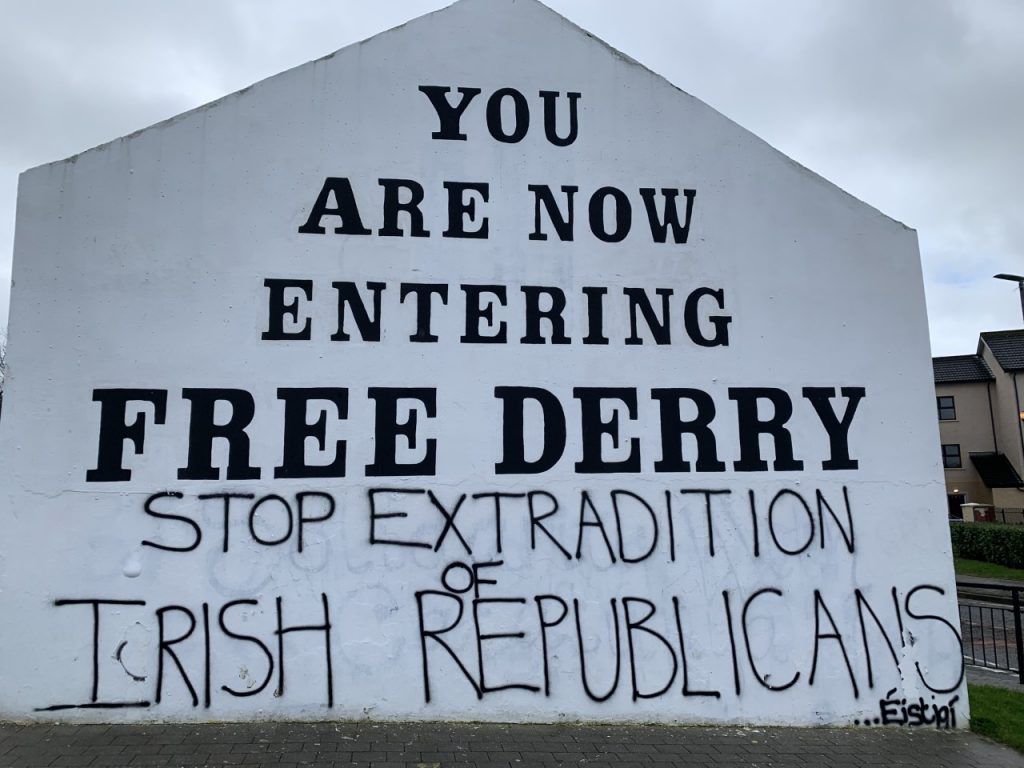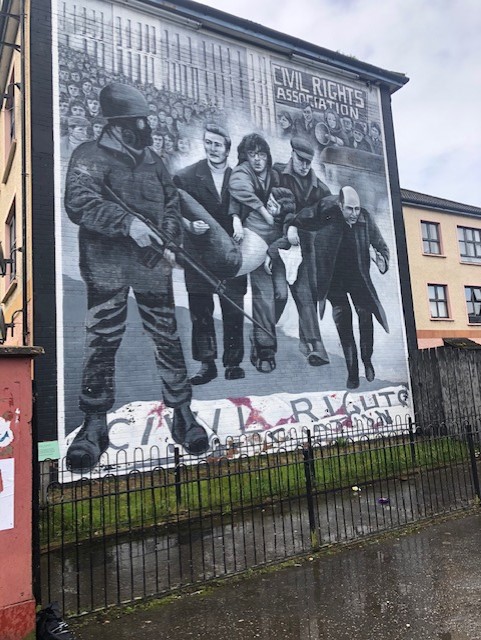A quick two-hour bus ride out of Belfast led us to the office of the South East Fermanagh Foundation (“SEFF”) for our first stop of our Fermanagh day. There we were greeted with warm biscuits, cups of tea and the Director of SEFF, Kenny Donaldson, and his fellow staff members. SEFF was formed in 1998 to help support innocent victims and survivors of the Troubles in South East Fermanagh. Bridget Smith noted, “The messaging of SEFF was clear: ‘Terrorism knows no borders.’” As Brighton Tropha said, “Kenny Donaldson informed the group about all of the services that SEFF offers to victims and survivors of the Troubles, including counseling, complementary therapies, as well as community outreach and advocacy provided by the Advocacy for Innocent Victims project.” She added, “The most moving part of Mr. Donaldson’s presentation was when he turned the group’s attention to all of the quilts lining the walls of the room. The quilts each represented a different memorial message, but each were made up of dozens of hand embroidered patches – representing innocent terror victims or terror attacks resulting in the loss of innocent lives – bringing together victims under a banner of innocence.” The quilts (shown above and below) were quite amazing.
SEFF was formed in 1998 to help support innocent victims and survivors of the Troubles in South East Fermanagh. Bridget Smith noted, “The messaging of SEFF was clear: ‘Terrorism knows no borders.’” As Brighton Tropha said, “Kenny Donaldson informed the group about all of the services that SEFF offers to victims and survivors of the Troubles, including counseling, complementary therapies, as well as community outreach and advocacy provided by the Advocacy for Innocent Victims project.” She added, “The most moving part of Mr. Donaldson’s presentation was when he turned the group’s attention to all of the quilts lining the walls of the room. The quilts each represented a different memorial message, but each were made up of dozens of hand embroidered patches – representing innocent terror victims or terror attacks resulting in the loss of innocent lives – bringing together victims under a banner of innocence.” The quilts (shown above and below) were quite amazing.
It was during our time with Kenny that we also had the opportunity to hear from other individuals who are members of SEFF, and one that stuck out for most of the group and in particular 2L Michael Becker, was a man named Ernie. Becker recalls, “Ernie told us about his experiences during The Troubles and centered it around one specific story that changed his life forever. As a result of a bomb attack on the school bus that Ernie used to drive children in his neighborhood to school every day, Ernie’s son took his own life. Ernie told us about how he had taught his son how to drive the bus once he was old enough, how his son would help him out driving the bus and with the kids, and how that morning his son started up the bus and did the daily check. Ernie’s son blamed himself for what happened that day, for not seeing the bomb under the bus, for not being able to save the children from an unthinkable harm.” Michael reflected, “What Ernie shared with us that day showed me that the death toll of The Troubles has not stopped counting, and without groups like SEFF who provide a platform for people to discuss the tragedies they have endured, that number will continue to rise with no end in sight.” Ernie with student Bridget Smith
Ernie with student Bridget Smith
The hardest part of the day was after lunch when we hopped back on the bus for a “tour” of the border between Northern Ireland and Ireland. The roads meandered back and forth between the two as we crossed the border multiple times within the hour (showing us also how impossible Brexit with a hard border could be). Our guide for this part of the tour told us the history of every attack that happened in this area throughout the Troubles and the combination of the description of the horrible attacks, the matter-of-fact tone of the explanation (here is where the farmer x was attacked; here is where this bombing took place; here is where this body was dumped etc), and the motion of the stop-and-start bus made for a pretty unpleasant, if important, experience. Below is a picture of one of the memorials to terror victims at a church in the area.






